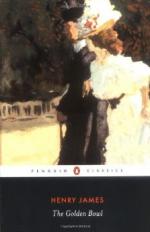The peace, it must be added, had become, as the days elapsed, a peace quite generally animated and peopled—thanks to that fact of the presence of “company” in which Maggie’s ability to preserve an appearance had learned, from so far back, to find its best resource. It was not inconspicuous, it was in fact striking, that this resource, just now, seemed to meet in the highest degree every one’s need: quite as if every one were, by the multiplication of human objects in the scene, by the creation, by the confusion, of fictive issues, hopeful of escaping somebody else’s notice. It had reached the point, in truth, that the collective bosom might have been taken to heave with the knowledge of the descent upon adjacent shores, for a short period, of Mrs. Rance and the Lutches, still united, and still so divided, for conquest: the sense of the party showed at least, oddly enough, as favourable to the fancy of the quaint turn that some near “week-end” might derive from their reappearance. This measured for Maggie the ground they had all travelled together since that unforgotten afternoon of the none so distant year, that determinant September Sunday when, sitting with her father in the park, as in commemoration of the climax both of their old order and of their old danger, she had proposed to him that they should “call in” Charlotte,—call her in as a specialist might be summoned to an invalid’s chair. Wasn’t it a sign of something rather portentous, their being ready to be beholden, as for a diversion, to the once despised Kitty and Dotty? That had already had its application, in truth, to her invocation of the Castledeans and several other members, again, of the historic Matcham week, made before she left town, and made, always consistently, with an idea—since she was never henceforth to approach these people without an idea, and since that lurid element of their intercourse grew and grew for her with each occasion. The flame with which it burned afresh during these particular days, the way it held up the torch to anything, to everything, that might have occurred as the climax of revels springing from traditions so vivified—this




